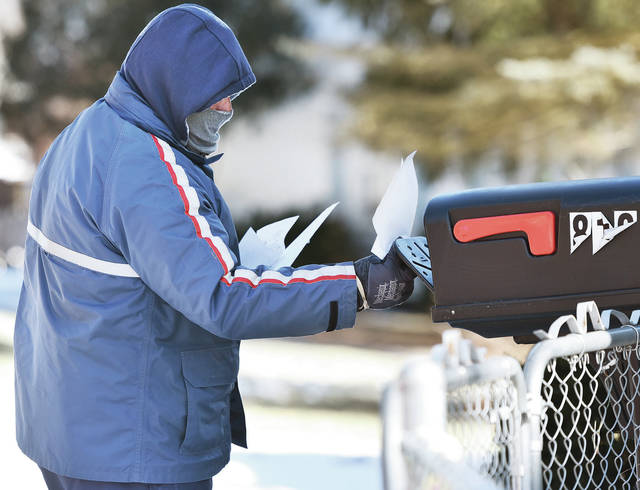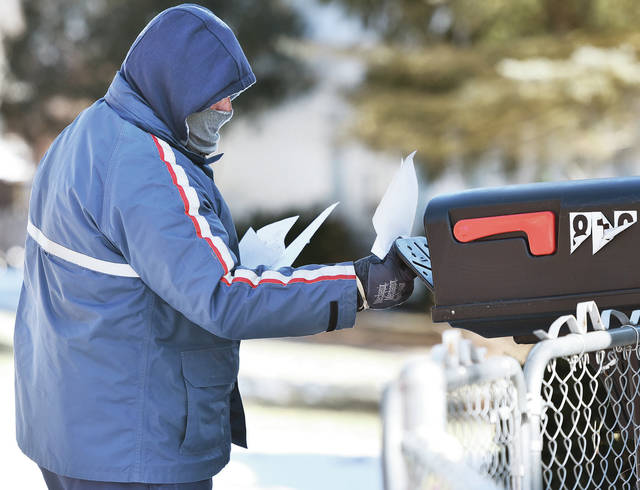



SIDNEY — The frigid temperatures Wednesday morning didn’t stop mail carriers in Shelby County from their appointed rounds of delivering the mail.
However in some parts of Ohio — those with area codes beginning with 452, 430-432 in the Ohio Valley, which is in the Cincinnati and Columbus areas, and 441 and 485 in northern Ohio, which includes the Cleveland and Lima areas — the U.S. Postal Service halted mail delivery for the day.
Sidney Post Office clerk Monica Francis said they didn’t know how the U.S. Postal Service made the decision of where mail would and would not be delivered in Ohio. Temperatures in Ohio are dipping into the negatives with wind chill factors lowering the temperature even more.
“We have 12 routes in Sidney,” said Francis. “We have 14-15 carriers, but today is some of their days off. So we have no extra carriers” to be on the routes.
Francis said a morning service talk was held reminding the carriers what the signs are for frostbite and to bundle up their extremities while delivering the mail.
“Once the mail got here, they went out,” said Francis. “The city carriers were out around 9 a.m.”
When asked what residents could do to make the mail delivery go smoother Wednesday and Thursday, Francis said, “make sure everything is clear so the carrier can get to your mailboxes.”
The U.S. Postal Service suspended mail delivery Wednesday in parts of Michigan, Indiana, Illinois, Iowa, Pennsylvania North and South Dakotas and Nebraska.
The cold temperatures is also causing a strain on electrical providers throughout the state.
Matt Berry, Midwest Electric CEO, St. Marys, said the company is performing limited and targeted reductions in power use for its customers.
“Participating members have a load control switch on their electric water heater. We send a radio signal that activates the switch and interrupts power to the water heater for a few hours during the peak period. It’s important to note this is simply an economic thing to help us lower our costs, since power costs more during peak periods. It’s not an emergency; we’re not running out of electricity,” said Berry.
Midwest Electric, said Berry, had a couple of big outages Wednesday morning in the Chickasaw, Fort Recovery, Coldwater and St. Henry areas.
“The outages were caused by problems with DP&L’s transmission service to our distribution substations. The outages lasted about three hours,” said Berry.
Berry said the company uses social media to keep their customers informed of what is happening with power outages.
“For the unplanned outages, we use our Facebook and Twitter pages when it’s a larger outage (typically more than 100 members) to provide status updates,” said Berry. “For load control, we usually use social media and sometimes also might do an e-mail blast (we have email addresses for about 65 percent of our members). For planned outages, we may use social media as well as recorded phone calls, depending on the extent of the outage.”
Pioneer Rural Electric is also enacting its load management program during the frigid weather.
“Our load management program is a voluntary program we have had in place since the early 1970s,” said Jodi Borger, communications coordinator for Pioneer Rural Electric Cooperative. “It allows our members to help reduce peak demand and keep the cost of electricity in check. We control load to control cost for our members — not a lack of power supply.
“Participating in this program makes our consumer-members eligible to receive various incentives,” Borger said. “Pioneer typically sees peaks in the summer months and rarely in the winter, with the exception of extremely cold days like today (Wednesday) or tomorrow (Thursday) – which sometimes catch our members off guard. In most cases electric water heaters are the only thing controlled during the winter — as was the case today. Since the water in an electric water heater stays warm for several hours without power, most members will never notice the temporary shutdown. Occasionally, we do control electric resistance backups on certain heating systems.”
Borger said the company has not had any weather-related outages as of press time Wednesday.
“We believe our preventive maintenance programs including tree trimming, pole testing, ash tree removal – removing nearly 12,000 to date – and constant system maintenance has played a big part in that,” said Borger.
Pioneer also relies on social media when contacting its customers about outages.
“For power outages, estimated restorations, and causes, we rely on our Facebook page,” said Borger. “We have our Facebook posts available on our webpage and during larger outages we will include a link to our Facebook page at the top of our website for easier access.
“During major outages, estimated restoration times can become more difficult to determine, but we do our best to keep members updated on our progress. We have plans to implement text and email notifications for outages in the very near future for members who choose to sign up for them,” said Borger.
“Load control notifications are typically posted to our Facebook page as well. We have started to collect email addresses for members who participate in our load management program and try to provide notifications there as well – often linking to our Facebook page for additional updates,” said Borger.
Schools across Ohio canceled classes for Wednesday. Some districts — including Sidney City Schools — announced Wednesday morning that classes would also be closed on Thursday.
“Russia plans to go tomorrow with a two hour delay as long as we have no issues with the buses,” said Superintendent Steve Rose. “We have put additive in fuel as a preventative measure and expect them to start without issues. We would cancel if the temperature is below -10 or the windchill is below -20. Also as a precaution we have a spare warmed up and ready to if we have any issues.”
Christian Academy Schools Superintendent Dick Dray said Wednesday afternoon no decision had been made about whether to delay or cancel school for Thursday.
“Each day is typically on a needed basis,” said Dray.
“Safety for our students, families and staff is always the priority. When making the decision it is with counsel from internal staffing as well as external sources such as law enforcement, public and private school officials and weather experts. Weather is considered for travel for both vehicle and pedestrian means both off the school property and on site.
“We also will take into consideration decisions by local school districts related to transportation that may impact our students and families as nearly 40 percent of our students routinely utilize public transportation,” said Dray.
Fort Loramie Local Schools Superintendent Dan Holland said Wednesday afternoon he didn’t know if Thursday classes would be delayed of canceled.
“The biggest priorities are student safety, and potential mechanical issues with our buses. When the temperature reaches dangerous levels in regards to hypothermia and frostbite, we have to start thinking about how we can get our kids to school safely,” said Holland. “We don’t have a lot of walkers because we have town courtesy stops. But, we do have kids who are outside waiting on their buses to arrive, and during that time, the extreme cold temperatures are worrisome.”
The second issue is the operation of the buses said Holland.
“The extreme cold temperatures and wind chill have an effect on them. First, we have to make sure they can provide heat on a consistent basis during the route,” said Holland. “Secondly, we have had issues in the past with fuel gelling up and causing mechanical issues. We have had other minor mechanical issues as well due to the temperatures. Today, we ran each bus on a short route to see how it responded to the temperature. Three of our buses did not respond positively to the weather.
“Finally, we do have to think about whether or not our boilers can maintain heat in the buildings. Today, we were able to keep the temperatures in all classrooms and throughout the facilities at a very comfortable level,” said Holland.
Hardin-Houston Local School Superintendent Larry Claypool said he’ll be making a decision Wednesday evening about the status of Thursday classes.
“When I do make a decision,”said Claypool, “I take the following under consideration: Snow and ice road conditions from night before and early morning driving. I consider the level of weather road crew work on back roads and intersections. I look at temperature and wind chill and whether the temperature could be dangerous for the student waiting for the bus.
“Unlike city and some county schools where there are a large number of district walkers, we have almost no walkers at all. Therefore, our decision is based on whether our students on bus routes can safely wait at a bus stop, usually in heated automobiles or in their warm house and then when the see the bus approaching get on the bus with minimal wind/temperature exposure,” said Claypool.
The Sidney-Shelby County Salvation Army has had its warming shelter open since Jan. 28 because of the frigid temperatures. It will be open through Jan. 31. Anyone needing a warm place to stay, a hot meal, hot beverages, and a light breakfast may come to the facility starting at 6:30 p.m. each evening. The doors will shut at 9 p.m, so anyone needing shelter must be in the shelter by that time.
From now until Feb. 6, the Sidney Daily News online electronic edition is open to the public due to the extreme and dangerous weather. No password is required to view the daily pages during this time.
To access this feature, log on to www.sidneydailynews.com, scroll to the bottom of the home page and click on the E-Edition to view pages.
The bitter cold is the result of a split in the polar vortex that allowed temperatures to drop much farther south than normal. That meant temperatures in parts of the Midwest were lower Wednesday than in Antarctica, where the Amundsen-Scott South Pole Station hit negative 25 degrees (negative 31.7 Celsius) — balmy compared to Fargo, North Dakota’s negative 31 degrees (negative 35 Celsius) and Minneapolis’ negative 27 degrees (negative 32 Celsius), according to the National Weather Service.



